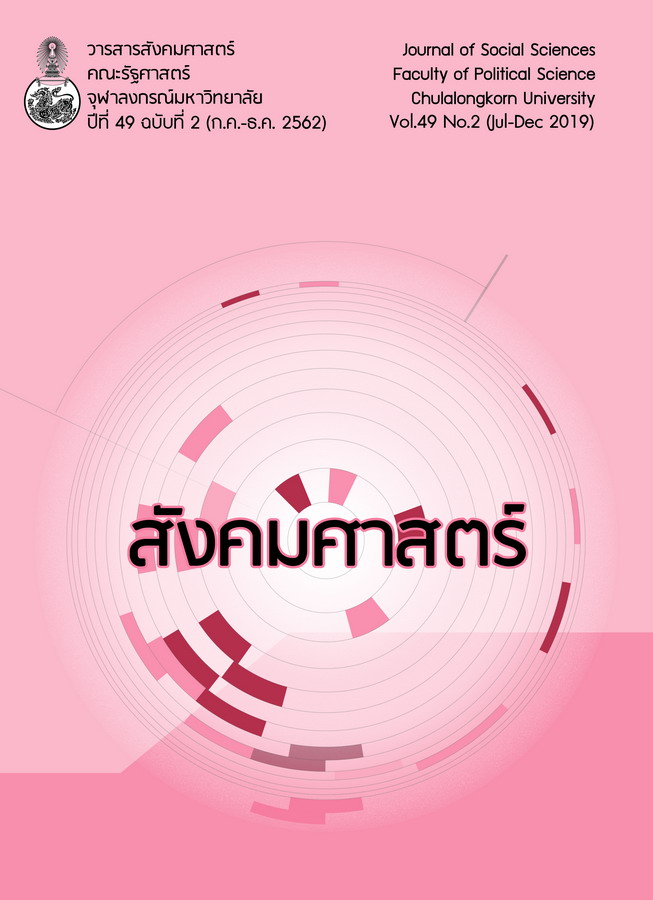ความคาดหวังว่าผู้สมัครจะชนะเลือกตั้งเป็นตัวกำกับความสัมพันธ์ระหว่างความเป็นตัวแทนความคิดทางการเมืองและข้อตัดสินใจเลือก
DOI:
https://doi.org/10.61462/cujss.v49i2.727คำสำคัญ:
ความคาดหวังที่ผู้สมัครจะชนะการเลือกตั้ง, ตัวแทนความคิดทางการเมือง, ข้อตัดสินใจเลือกในการเลือกตั้ง, ตัวแปรกำกับบทคัดย่อ
การวิจัยนี้มีวัตถุประสงค์เพื่อศึกษาการตัดสินใจเลือกลงคะแนนเสียงให้ผู้สมัครรับเลือกตั้งหรือพรรคการเมืองของคนไทยว่าเป็นการเลือกเพราะเป็นตัวแทนความคิดทางการเมืองของตนหรือเป็นผู้สมัครและ/หรือพรรคการเมืองที่เขาคาดว่าจะชนะการเลือกตั้ง หรือทั้งสองอย่างร่วมกัน ตัวอย่างจำนวน 1,500 คน มาจากชุดข้อมูลการสำรวจระดับชาติ “ความคิดเห็นของประชาชนชาวไทยต่อการเลือกตั้งสมาชิกสภาผู้แทนราษฎร พ.ศ. 2554 ก่อนการเลือกตั้ง” โดยสถาบันพระปกเกล้าและสำนักงานสถิติแห่งชาติ ผลการทดสอบความเป็นอิสระและการสร้างตัวแบบล็อกลิเนียร์พบว่า คนไทยจะเลือกลงคะแนนเสียงให้กับผู้สมัครรับเลือกตั้งหรือพรรคการเมืองที่เป็นทั้งตัวแทนความคิดทางการเมืองของตนและมีแนวโน้มว่าจะชนะด้วย ดังนั้นการเป็นตัวแทนความคิดทางการเมืองเป็นสิ่งที่นักการเมืองและพรรคการเมืองต้องให้ความสำคัญในการหาเสียงพร้อมทั้งต้องทำให้ประชาชนเชื่อมั่นได้ว่าตนหรือพรรคจะชนะการเลือกตั้ง การวิจัยในอนาคตควรสนใจศึกษายุทธศาสตร์การสื่อสารทางการเมืองที่มีประสิทธิภาพโดยเฉพาะอย่างยิ่งกับพรรคการเมืองขนาดกลางและเล็กที่จะทำให้ประชาชนรู้สึกว่ามีโอกาสชนะการเลือกตั้ง
Downloads
เอกสารอ้างอิง
Agresti, Alan. 2002. Categorical Data Analysis. 2nd ed. Hobeken, NJ: John-Wiley.
Ajzen, Icek. 1985. "From Intention to Actions: A Theory of Planned Behavior." In Action Control: From Cognitions to Behavior, edited by Julius Kuhl and Jurgen Beckmann, 11-39. New York: Springer-Verlag.
-----. 2012. "The Theory of Planned Behavior." In Handbook of Theories of Social Psychology , edited by Paul A. M. Van Lange, Arie W. Kruglanski and E. Tory Higgins, 438-459. London: SAGE.
Bandura, Albert. 1982. "Self-Efficacy Mechanism in Human Agency." American Psychologist 37(2): 122-147.
-----. 1977. "Self-Efficacy: Toward a Unifying Theory of Behavioral Change." Psychological Review 84(2): 191-215.
-----. 1997. Self-Efficacy: The Exercise of Control. New York: Freeman.
-----. 1986. Social Foundations of Thought and Action: A Social Cognitive Theory. Englewood Cliffs, NJ: Prentice-Hall.
Baron, Reuben M., and David A. Kenny. 1986. "The Moderator-Mediator Variable Distinction in Social Psychological Research: Conceptual, Strategic, and Statistical Considerations." Journal of Personality and Social Psychology 51(6): 1173-1182.
Campbell, Angus, Gerald Gurin, and Warren Edward Miller. 1954. The Voter Decides. Evanston, IL: Row, Peterson and Co.
Chai-Anan Samudavanija. 1974. Udomkan Thang Kanmueang. [Political Ideology]. Bangkok: Kledthai. (in Thai)
Coopersmith, Stanley. 1981. The Antecedents of Self-Esteem. 2nd ed. Palo Alto, CA: Consulting Psychologists Press.
Downs, Anthony. 1957. An Economic Theory of Democracy. New York: Harper & Row.
Dutton, Jane E., Janet M. Dukerich, and Celia V. Harquail. 1994. "Organizational Images and Member Identification." Administrative Science Quarterly 39(2): 239–263.
Erikson, Robert S., and Kent L. Tedin. 2003. American Public Opinion: Its Origins, Content and Impact. 6th ed. New York: Longman.
Graham, Jesse, Jonathan Haidt, and Brian A. Nosek. 2009. "Liberals and Conservatives Rely on Different Sets of Moral Foundations." Journal of Personality and Social Psychology 96(5): 1029–1046.
Haslam, S. Alexander, Jolanda Jetten, Tom Postmes, and Catherine Haslam. 2009. “Social Identity, Health and Well-Being: An Emerging Agenda for Applied Psychology." Applied Psychology: An International Review 58(1): 1-23. doi: 10.1111/j.1464-0597.2008.00379.x.
Jost, John T., Jack Glaser, Arie W. Kruglanski, and Frank J. Sulloway. 2003. "Political Conservatism as Motivated Social Cognition." Psychological Bulletin 129(3): 339–375.
Madden, Thomas J., Pam Scholder Ellen, and Icek Ajzen. 1992. "A Comparison of the Theory of Planned Behavior and the Theory of Reasoned Action." Personality and Social Psychology Bulletin 18(1): 3-9.
Meyer, David, Achim Zeileis, and Kurt Hornik. 2006. "The Strucplot Framework: Visualizing Multi-way Contingency Tables with VCD." Journal of Statistical Software 17(3): 1-48.
Mueller, Dennis Cary. 2003. Public Choice III. Cambridge: Cambridge University Press.
Paiboon Kamonsujjaritpan. 2000. "Kan Suesan Phaplak: Korrani Sueksa Phak Thai Rak Thai.” [Political Party's Image Communication: A Case Study of Thais Love Thais Party]." Master’s thesis, Faculty of Journalism and Mass Communication, Thammasat University. (in Thai)
Scott, Craig R., Steven R. Corman, and George Cheney. 1998. "Development of a Structurational Model of Identification in the Organization." Communication Theory 8(3): 298–336. doi: 10.1111/j.1468-2885.1998.tb00223.x.
Somkiat Wanthana. 2001. Udomkan Thang Kanmueang Ruam Samai. [Contemporary Political Ideologies]. Bangkok: Aksorn Khaosuai. (in Thai)
Tajfel, Henri, and John Charles Turner. 1979. "An Integrative Theory of Intergroup Conflict." In The Social Psychology of Intergroup Relations, edited by W. G. Austin and S. Worchel, 33–47. Monterey, CA: Brooks/Cole.
-----. 1986. "The Social Identity Theory of Intergroup Behaviour." In The Psychology of Intergroup Relations, edited by S. Worchel and W. G. Austin, 7–24. Chicago, IL: Nelson-Hall.
Thailand. National Statistical Office. Statistical Forecasting Bureau. 2012. Rai-ngan Sathiti Rai Pi Prathet Thai 2555. [Statistical Yearbook Thailand 2012]. Bangkok: The Office. (in Thai)
Turner, John Charles, and Katherine J. Reynolds. 2012. "Self-Categorization Theory." In Handbook of Theories in Social Psychology, edited by Paul A.M. Van Lange, Arie W. Kruglanski and E. Tory Higgins, 399-417. London: SAGE. doi: http://dx.doi.org/10.4135/9781446249222.n46.
-----. 2008. "The Social Identity Perspective in Intergroup Relations: Theories, Themes, and Controversies." In Blackwell Handbook of Social Psychology: Intergroup Processes, edited by Rupert Brown and Samuel L. Gaertner, 133–152. Malden, MA: Blackwell.
Turner, John Charles, and Penny Oakes. 1986. "The Significance of the Social Identity Concept for Social Psychology with Reference to Individualism, Interactionism and Social Influence." British Journal of Social Psychology 25(3): 237–252.
ดาวน์โหลด
เผยแพร่แล้ว
รูปแบบการอ้างอิง
ฉบับ
ประเภทบทความ
สัญญาอนุญาต
ลิขสิทธิ์ (c) 2019 คณะรัฐศาสตร์ จุฬาลงกรณ์มหาวิทยาลัย

อนุญาตภายใต้เงื่อนไข Creative Commons Attribution-NonCommercial-NoDerivatives 4.0 International License.
เงื่อนไขการอนุญาตสาธารณะ
นโยบายลิขสิทธิ์และการอนุญาต
วารสารสังคมศาสตร์ จุฬาลงกรณ์มหาวิทยาลัย เผยแพร่เนื้อหาทั้งหมดภายใต้ สัญญาอนุญาตครีเอทีฟคอมมอนส์แบบแสดงที่มา-ไม่ใช้เพื่อการค้า-ไม่ดัดแปลง 4.0 นานาชาติ (CC BY-NC-ND 4.0)
ลิขสิทธิ์
บทความทั้งหมดที่ตีพิมพ์ในวารสารสังคมศาสตร์ จุฬาลงกรณ์มหาวิทยาลัย เป็นลิขสิทธิ์ของ คณะรัฐศาสตร์ จุฬาลงกรณ์มหาวิทยาลัย ผู้เขียนจะโอนสิทธิ์ทั้งหมดให้แก่วารสารเมื่อบทความได้รับการตอบรับให้ตีพิมพ์
สัญญาอนุญาต CC BY-NC-ND 4.0
ภายใต้สัญญาอนุญาตนี้:
-
แสดงที่มา (BY): ผู้ใช้ต้องแสดงที่มาโดยอ้างอิงถึงผู้เขียน คณะรัฐศาสตร์ จุฬาลงกรณ์มหาวิทยาลัย และวารสารสังคมศาสตร์ จุฬาลงกรณ์มหาวิทยาลัย พร้อมทั้งให้ลิงก์ไปยังสัญญาอนุญาต และระบุหากมีการเปลี่ยนแปลง ทั้งนี้สามารถทำได้ในลักษณะที่สมเหตุสมผล แต่ต้องไม่ทำในลักษณะที่แสดงว่าผู้อนุญาตให้การรับรองผู้ใช้หรือการใช้งานดังกล่าว
-
ไม่ใช้เพื่อการค้า (NC): ผู้ใช้ไม่สามารถใช้เนื้อหาเพื่อวัตถุประสงค์ทางการค้า การใช้งานเชิงพาณิชย์จะต้องได้รับอนุญาตเป็นลายลักษณ์อักษรล่วงหน้าจากผู้เขียนและคณะรัฐศาสตร์ จุฬาลงกรณ์มหาวิทยาลัย
-
ไม่ดัดแปลง (ND): หากผู้ใช้นำเนื้อหาไปรวม ดัดแปลง หรือต่อยอด ผู้ใช้ไม่สามารถเผยแพร่งานที่ดัดแปลงนั้นได้ การดัดแปลงผลงานจะต้องได้รับอนุญาตเป็นลายลักษณ์อักษรล่วงหน้าจากผู้เขียนและคณะรัฐศาสตร์ จุฬาลงกรณ์มหาวิทยาลัย
นโยบายการเข้าถึงแบบเปิด
วารสารสังคมศาสตร์ จุฬาลงกรณ์มหาวิทยาลัย ให้การเข้าถึงเนื้อหาแบบเปิดโดยทันทีตามหลักการที่ว่าการทำให้งานวิจัยสามารถเข้าถึงได้อย่างเสรีแก่สาธารณะจะสนับสนุนการแลกเปลี่ยนความรู้ในระดับโลก ผู้ใช้สามารถอ่าน ดาวน์โหลด คัดลอก เผยแพร่ พิมพ์ ค้นหา หรือเชื่อมโยงไปยังเนื้อหาฉบับเต็มของบทความได้โดยไม่ต้องขออนุญาตล่วงหน้าจากผู้จัดพิมพ์หรือผู้เขียน ทั้งนี้เป็นไปตามสัญญาอนุญาต CC BY-NC-ND 4.0
นโยบายการเก็บบันทึกด้วยตนเอง
ผู้เขียนสามารถเก็บบันทึกบทความฉบับตีพิมพ์สุดท้าย ต้นฉบับที่ส่ง (preprint) หรือฉบับที่ผ่านการประเมิน (postprint) ในคลังสถาบันหรือเว็บไซต์ส่วนตัวได้ โดยต้องมีการอ้างอิงการตีพิมพ์ครั้งแรกในวารสารสังคมศาสตร์ จุฬาลงกรณ์มหาวิทยาลัย พร้อมระบุแหล่งอ้างอิงที่สมบูรณ์และลิงก์ไปยังเว็บไซต์ของวารสาร
การขออนุญาต
สำหรับการใช้งานนอกเหนือจากที่ครอบคลุมโดยสัญญาอนุญาต CC BY-NC-ND 4.0 กรุณาติดต่อ:
กองบรรณาธิการ
วารสารสังคมศาสตร์ จุฬาลงกรณ์มหาวิทยาลัย
คณะรัฐศาสตร์ จุฬาลงกรณ์มหาวิทยาลัย
Email: cusocscij@gmail.com
สำหรับข้อมูลเพิ่มเติมเกี่ยวกับสัญญาอนุญาตครีเอทีฟคอมมอนส์แบบแสดงที่มา-ไม่ใช้เพื่อการค้า-ไม่ดัดแปลง 4.0 นานาชาติ กรุณาเยี่ยมชม: https://creativecommons.org/licenses/by-nc-nd/4.0/deed.th





